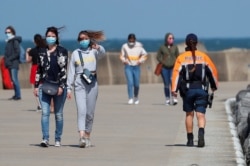European governments are scrambling to shape radical plans to cope with a second wave of coronavirus contagion, expected to unfold later in the year. The current infection spikes some countries are experiencing is not a second wave, but the playing out of the first wave of the pandemic, according to some officials and experts in infectious diseases.
Governments are desperate to avoid imposing nationwide lockdowns, or shutting down already grievously damaged economies.
Britain’s Boris Johnson has said a second blanket shutdown would be akin to detonating a nuclear explosion. To avoid that, Britain’s ruling Conservatives are considering ordering all people over the age of 50 years old to remain at home, if a second wave starts unfolding.
That proposal has prompted the fury of the country’s tabloid press, whose readers tend to be the over-fifties. The Daily Mail newspaper said the move would be “ageist.” It warned such a strategy was flawed because it failed to recognize the important contribution older workers make to the economy and risks stigmatizing the elderly.
Following another British weekend that saw tens of thousands of the young flouting distancing rules across the country, crowding beaches and holding impromptu street parties, other critics said the government should prioritize enforcing current social-distancing and mask-wearing rules.
A former government adviser Joan Bakewell said ministers need to tackle the problem of young people ignoring COVID rules. “Certainly older people have to take care — I have been taking great care myself — but what is happening is that young people are not distancing and they are not wearing masks. The young have got to get their act together,” she said.
Britain is not the only European nation eyeing nervously the resurgence of cases and fearing a return to the grim days of March and April, when the virus was spreading rapidly across the continent, prompting blanket lockdowns. Governments are rushing to stock up on personal protective gear and drugs in anticipation of a European winter that could strain health care systems once again.
This one is different
The World Health Organization, WHO, has cautioned against thinking about seasons and waves. “What we all need to get our heads around is this is a new virus and this one is behaving differently,” Margaret Harris, a spokesperson at the U.N. agency, told a virtual press conference in Geneva. According to Harris, the virus is unfolding in “one big wave,” noting that the overall cases numbers have doubled in the past month-and-half.
Thirty-six European countries have seen an increase in infections in the last seven days, with many more cases on average than the previous week. Countries with less stringent COVID measures are experiencing a higher rate of infection, according to Blavatnik School at Oxford University.
Jose Vazquez-Boland, an infectious disease expert at the University of Edinburgh, warns “there will be a resurgence of new cases every time social restriction measures are lifted as long as the virus remains in circulation.”
Sweden, which has pursued a strategy of more relaxed restrictions, and Italy, are both outliers currently to the general rule that easing sees a surge in new cases. Italy’s COVID curve has continued to flatten despite its significant easing of lockdown measures.
But in preparation for a surge in cases, the Italian Senate last week approved Prime Minister Conte’s request to prolong the country’s state of emergency until October 15, allowing him greater flexibility in ordering localized lockdowns or imposing new targeted measures. Greece has made masks mandatory in shops and in all public buildings. French authorities have warned citizens to remain highly vigilant.
But there is rising trepidation, and a patchwork of strategies are emerging across the European Union, leaving Brussels trailing in the wake of national decision making. Despite Brussels’ arguing the pandemic can only be overcome if EU states observe solidarity and strive to coordinate their initiatives, national governments have little option but to pursue their own localized strategies. Their electorates are demanding it, and each country has its own set of unique challenges to overcome, say analysts.
Some tit-for-tat moves are occurring. After the Dutch cautioned against non-essential travel to neighboring Belgium, the Belgian government retaliated, announcing that any Belgian nationals or residents returning from visiting Holland would have to be tested for the virus and undergo a period of quarantine.
That despite the fact that Belgium has a higher number of new cases compared to Holland. More than half of Brussels municipalities are now past the so-called “alarm threshold” for new coronavirus infections. Sixteen out of the capital region’s 19 municipalities are seeing now 20 new cases per 100,000 inhabitants, according to government calculations.
Frustration building
Living with the virus until an effective vaccine is developed and widely distributed, likely 18 months away, is stretching not only state resources to near breaking point, but also exhausting imaginative ways to balance economic and public-health priorities. The hodgepodge of policy approaches is bewildering, with new measures abruptly being announced, while others are ditched, making it difficult for businesses to plan ahead.
Europe’s travel map is also getting more complicated with countries re-impose restrictions with hardly any warning. Greece has tightened the rules on crossing its northern borders, the Baltic countries frequently revamp their lists of which countries are safe. Britain is poised to add Belgium to its list of unsafe countries, requiring anyone who has traveled through it to undergo 14 days of quarantine, if they subsequently enter the UK. Last week Britain added with little notice Spain to its “at-risk" countries, just days after encouraging Britons to vacation in the country.
Authorities are fearful that public patience is wearing thin with the frequent changes and tweaks. The mass protest in Berlin organized by far-right and fringe groups Saturday — the capital saw around 20,000 gathered to protest mask rules other precautions — prompted official frustration.
Markus Söder, the prime minister of the regional state of Bavaria, and a potential candidate to succeed Chancellor Angela Merkel, warned, “We have to expect that corona will come back again with full force.” He tweeted: “Total alertness is needed, and that's why now is not the time for easing restrictions or naive carelessness.”
Saskia Esken, co-leader of Germany’s Social Democrats, the government’s junior coalition partner, vented anger. “Thousands of Covidiots are celebrating themselves as 'the second wave,' without distancing, without masks. They are putting at risk not only our health, but our successes against the pandemic, to revive the economy, education and society. Irresponsible!”
Some of the Berlin protesters said the pandemic was an invention of governments designed to subdue the people.
Government advisers in Britain are also nervous about the potential for widespread social unrest with concerns mounting that frustration over new lockdowns in north of the country could spark trouble on streets.
Last month, a government coronavirus advisory committee in Britain warned the country could face “grave challenges to public order” due to the “volatile” coronavirus situation. It cautioned that social unrest could make “the re-imposition of measures to control the spread of COVID-19 next to impossible and would be likely to require military support.”














